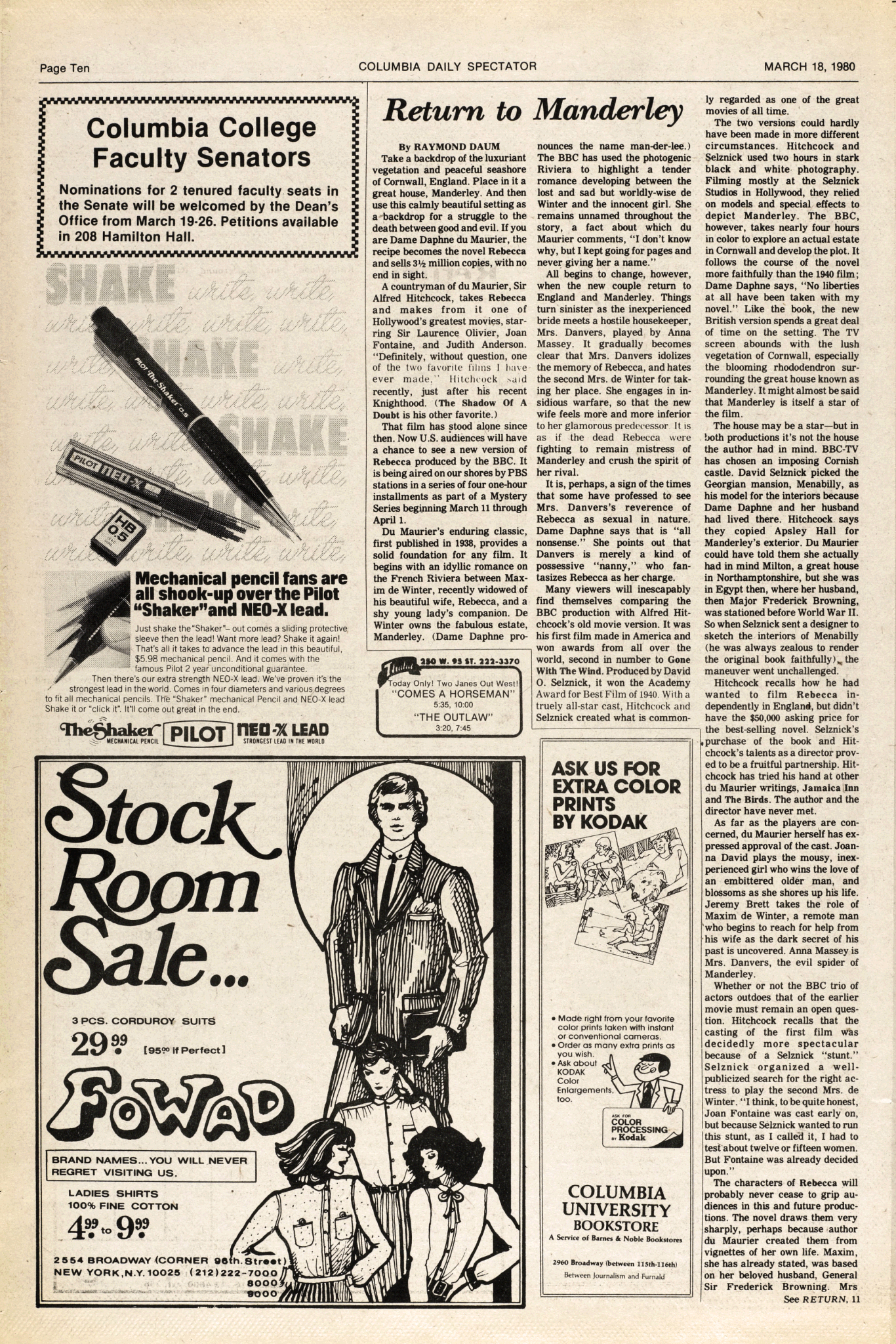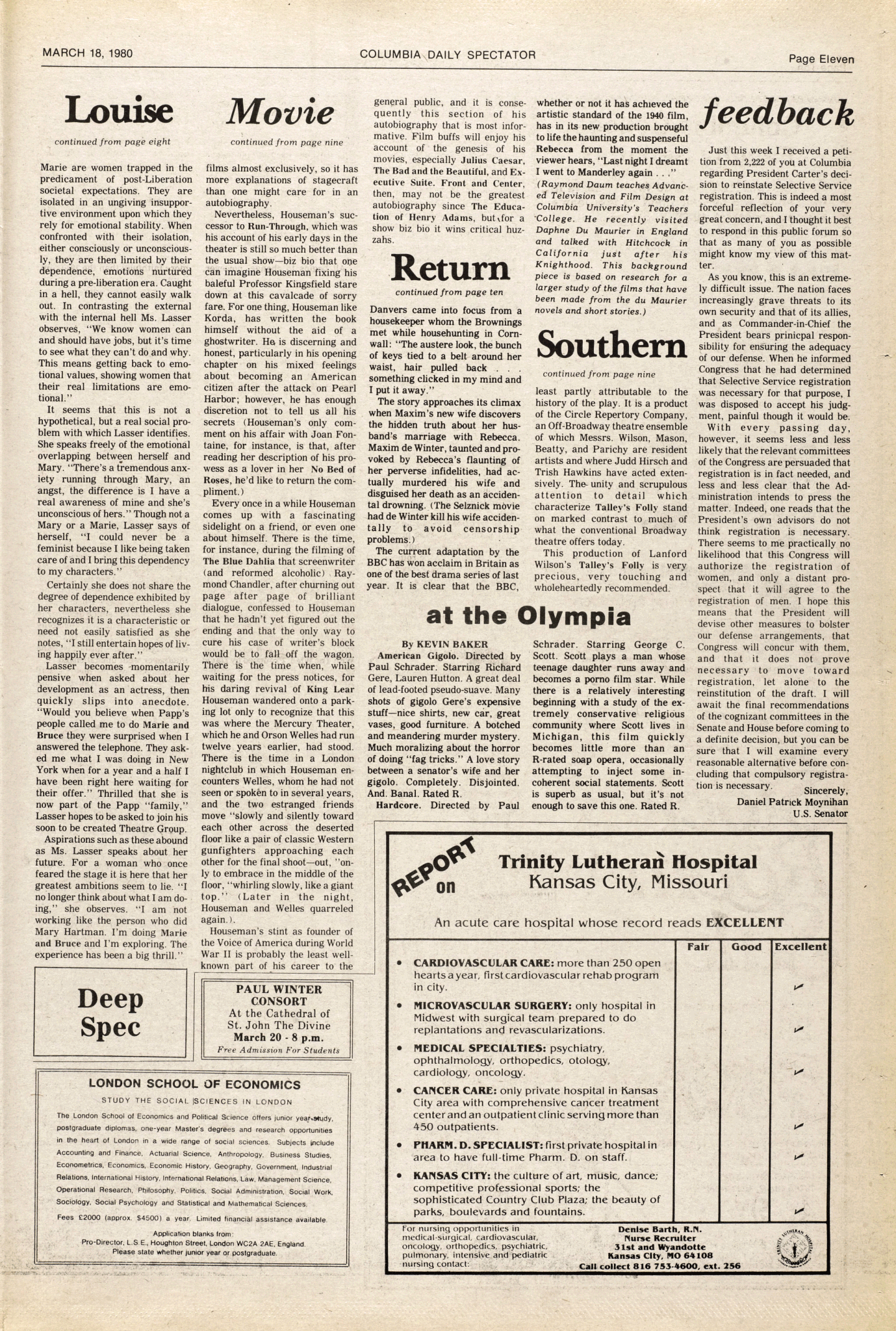Columbia Daily Spectator (13/Feb/1968) - Return to Manderley
Details
- article: Return to Manderley
- author(s): Raymond Daum
- newspaper: Columbia Daily Spectator (13/Feb/1968)
- keywords: Academy Awards, Alfred Hitchcock, Anna Massey, Daphne du Maurier, David O. Selznick, Jamaica Inn (1939), Joan Fontaine, Judith Anderson, Laurence Olivier, Rebecca (1938) by Daphne du Maurier, Rebecca (1940), Rebecca (1979), Shadow of a Doubt (1943), The Birds (1963)
Links
Article
Return to Manderley
Take a backdrop of the luxuriant vegetation and peaceful seashore of Cornwall, England. Place in it a great house, Manderley. And then use this calmly beautiful setting as a backdrop for a struggle to the death between good and evil. If you are Dame Daphne du Maurier, the recipe becomes the novel Rebecca and sells 3½ million copies, with no end in sight.
A countryman of du Maurier, Sir Alfred Hitchcock, takes Rebecca and makes from it one of Hollywood's greatest movies, starring Sir Laurence Olivier, Joan Fontaine, and Judith Anderson. "Definitely, without question, one of the two favorite films I have ever made," Hitchcock said recently, just after his recent Knighthood. (The Shadow Of A Doubt is his other favorite.)
That film has stood alone since then. Now U.S. audiences will have a chance to see a new version of Rebecca produced by the BBC. It is being aired on our shores by PBS stations in a series of four one-hour installments as part of a Mystery Series beginning March 11 through April 1.
Du Maurier's enduring classic, first published in 1938, provides a solid foundation for any film. It begins with an idyllic romance on the French Riviera between Maxim de Winter, recently widowed of his beautiful wife, Rebecca, and a shy young lady's companion. De Winter owns the fabulous estate, Manderley. (Dame Daphne pronounces the name man-der-lee.) The BBC has used the photogenic Riviera to highlight a tender romance developing between the lost and sad but worldly-wise de Winter and the innocent girl. She remains unnamed throughout the story, a fact about which du Maurier comments, "I don't know why, but I kept going for pages and never giving her a name."
All begins to change, however, when the new couple return to England and Manderley. Things turn sinister as the inexperienced bride meets a hostile housekeeper, Mrs. Danvers, played by Anna Massey. It gradually becomes clear that Mrs. Danvers idolizes the memory of Rebecca, and hates the second Mrs. de Winter for taking her place. She engages in insidious warfare, so that the new wife feels more and more inferior to her glamorous predecessor It is as if the dead Rebecca were fighting to remain mistress of Manderley and crush the spirit of her rival.
It is, perhaps, a sign of the times that some have professed to see Mrs. Danvers's reverence of Rebecca as sexual in nature. Dame Daphne says that is "all nonsense." She points out that Danvers is merely a kind of possessive "nanny," who fantasizes Rebecca as her charge.
Many viewers will inescapably find themselves comparing the BBC production with Alfred Hitchcock's old movie version. It was his first film made in America and won awards from all over the world, second in number to Gone With The Wind. Produced by David O. Selznick, it won the Academy Award for Best Film of 1940. With a truely all-star cast, Hitchcock and Selznick created what is commonly regarded as one of the great movies of all time.
The two versions could hardly have been made in more different circumstances. Hitchcock and Selznick used two hours in stark black and white photography. Filming mostly at the Selznick Studios in Hollywood, they relied on models and special effects to depict Manderley. The BBC, however, takes nearly four hours in color to explore an actual estate in Cornwall and develop the plot. It follows the course of the novel more faithfully than the 1940 film; Dame Daphne says, "No liberties at all have been taken with my novel." Like the book, the new British version spends a great deal of time on the setting. The TV screen abounds with the lush vegetation of Cornwall, especially the blooming rhododendron surrounding the great house known as Manderley. It might almost be said that Manderley is itself a star of the film.
The house may be a star — but in both productions it's not the house the author had in mind. BBC-TV has chosen an imposing Cornish castle. David Selznick picked the Georgian mansion, Menabilly, as his model for the interiors because Dame Daphne and her husband had lived there. Hitchcock says they copied Apsley Hall for Manderley's exterior. Du Maurier could have told them she actually had in mind Milton, a great house in Northamptonshire, but she was in Egypt then, where her husband, then Major Frederick Browning, was stationed before World War II. So when Selznick sent a designer to sketch the interiors of Menabilly (he was always zealous to render the original book faithfully)* the maneuver went unchallenged.
Hitchcock recalls how he had wanted to film Rebecca independently in England, but didn't have the $50,000 asking price for the best-selling novel. Selznick's purchase of the book and Hitchcock's talents as a director proved to be a fruitful partnership. Hitchcock has tried his hand at other du Maurier writings, Jamaica Inn and The Birds. The author and the director have never met.
As far as the players are concerned, du Maurier herself has expressed approval of the cast. Joanna David plays the mousy, inexperienced girl who wins the love of an embittered older man, and blossoms as she shores up his life. Jeremy Brett takes the role of Maxim de Winter, a remote man who begins to reach for help from his wife as the dark secret of his past is uncovered. Anna Massey is Mrs. Danvers, the evil spider of Manderley.
Whether or not the BBC trio of actors outdoes that of the earlier movie must remain an open question. Hitchcock recalls that the casting of the first film was decidedly more spectacular because of a Selznick "stunt." Selznick organized a well-publicized search for the right actress to play the second Mrs. de Winter. "I think, to be quite honest, Joan Fontaine was cast early on, but because Selznick wanted to run this stunt, as I called it, I had to test about twelve or fifteen women. But Fontaine was already decided upon."
The characters of Rebecca will probably never cease to grip audiences in this and future productions. The novel draws them very sharply, perhaps because author du Maurier created them from vignettes of her own life. Maxim, she has already stated, was based on her beloved husband, General Sir Frederick Browning. Mrs Danvers came into focus from a housekeeper whom the Brownings met while househunting in Cornwall: "The austere look, the bunch of keys tied to a belt around her waist, hair pulled back ... something clicked in my mind and I put it away."
The story approaches its climax when Maxim's new wife discovers the hidden truth about her husband's marriage with Rebecca. Maxim de Winter, taunted and provoked by Rebecca's flaunting of her perverse infidelities, had actually murdered his wife and disguised her death as an accidental drowning. (The Selznick movie had de Winter kill his wife accidentally to avoid censorship problems.)
The current adaptation by the BBC has won acclaim in Britain as one of the best drama series of last year. It is clear that the BBC, whether or not it has achieved the artistic standard of the 1940 film, has in its new production brought to life the haunting and suspenseful Rebecca from the moment the viewer hears, "Last night I dreamt I went to Manderley again..."
Raymond Daum teaches Advanced Television and Film Design at Columbia University's Teachers College. He recently visited Daphne Du Maurier in England and talked with Hitchcock in California just after his Knighthood. This background piece is based on research for a larger study of the films that have been made from the du Maurier novels and short stories.


